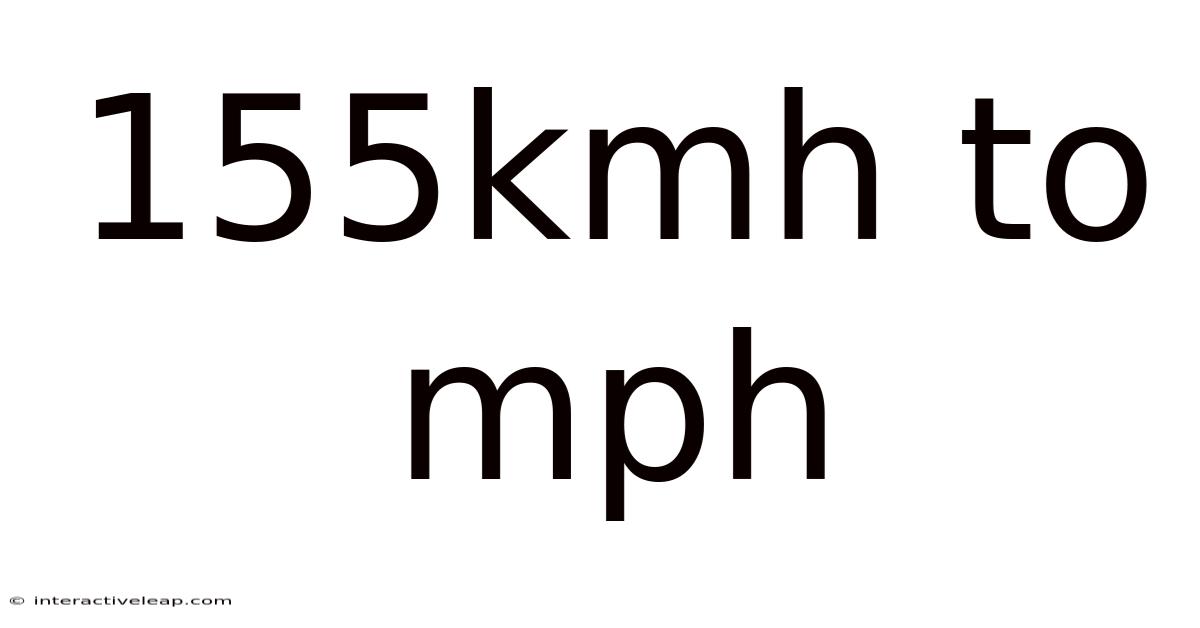155kmh To Mph
interactiveleap
Sep 22, 2025 · 4 min read

Table of Contents
155 km/h to mph: A Comprehensive Guide to Speed Conversions and Their Applications
Understanding speed conversions is crucial in various fields, from everyday driving to aerospace engineering. This comprehensive guide will delve into converting 155 kilometers per hour (km/h) to miles per hour (mph), exploring the underlying mathematics, practical applications, and addressing common misconceptions. We'll also examine the significance of accurate speed conversions in different contexts. This article provides a detailed explanation, perfect for students, drivers, and anyone interested in learning more about unit conversions and their real-world implications.
Introduction: The Importance of Speed Conversions
Speed is a fundamental concept in physics, representing the rate at which an object changes its position. Expressing speed consistently is vital for clear communication and accurate calculations. Different countries utilize different unit systems; the metric system (using kilometers and meters) is prevalent globally, while the imperial system (using miles and feet) remains common in some regions, particularly the United States. Therefore, the ability to convert between these systems, such as converting 155 km/h to mph, is essential for effective communication and problem-solving.
The Conversion Process: From Kilometers Per Hour to Miles Per Hour
The conversion from kilometers per hour (km/h) to miles per hour (mph) involves a simple mathematical process. The key conversion factor is the relationship between kilometers and miles: 1 kilometer is approximately equal to 0.621371 miles.
To convert 155 km/h to mph, we use this conversion factor:
155 km/h * 0.621371 miles/km ≈ 96.31 mph
Therefore, 155 km/h is approximately equal to 96.31 mph. It's important to note that this is an approximation because the conversion factor is a decimal value.
Understanding the Mathematics Behind the Conversion
The conversion relies on the concept of dimensional analysis. This involves carefully tracking the units throughout the calculation to ensure the final answer has the correct units. In this case, we multiply the speed in km/h by the conversion factor (miles/km). The kilometers unit cancels out, leaving us with the desired unit of miles per hour.
The calculation can be represented as follows:
(155 km/h) * (0.621371 miles/1 km) = 96.31 miles/h
Practical Applications of Speed Conversions
The ability to convert between km/h and mph is valuable in various situations:
-
International Travel: When traveling internationally, understanding speed limits and vehicle speeds requires conversion between metric and imperial units.
-
Automotive Engineering: Car manufacturers often provide specifications in both km/h and mph to cater to global markets.
-
Aviation: Air speeds are often expressed in knots (nautical miles per hour), requiring conversions to km/h or mph for comparison or calculations.
-
Sports: In motorsports, comparing speeds from different races or competitions requires converting between km/h and mph for fair comparison.
-
Scientific Research: In scientific research involving motion and velocity, it is crucial to maintain consistent units, requiring conversions between various systems.
-
Everyday Driving: Even in regions that primarily use one system, familiarity with the other is helpful for understanding speed limits and information displayed on vehicles or maps from different regions.
Beyond the Basics: Precision and Rounding
While the approximation of 96.31 mph is sufficient for many purposes, the level of precision required depends on the context. For instance, in scientific research, greater accuracy might be needed. Rounding to fewer significant figures (e.g., 96 mph) might be acceptable in everyday contexts, while more significant figures (e.g., 96.313 mph) would be preferred for more precise applications.
Common Misconceptions and Errors
A common mistake is to incorrectly apply the conversion factor or forget to cancel out the units. Always ensure the units are correctly handled during the calculation to prevent errors. Another misconception is believing that a simple multiplication or division by a specific number will always work accurately across all speed conversions.
Frequently Asked Questions (FAQ)
-
Q: Is there a single, universally accepted conversion factor? A: While 0.621371 is widely used, different levels of precision exist, so the exact number can vary slightly depending on the source.
-
Q: Can I use online calculators for this conversion? A: Yes, many online converters are readily available and can perform quick and accurate conversions between km/h and mph.
-
Q: What about other speed units, like knots? A: Converting to knots requires additional conversion factors. One nautical mile is approximately 1.852 kilometers.
-
Q: Why is accurate speed conversion important in aviation? A: Precise speed conversions are critical in aviation for navigation, air traffic control, and calculating fuel consumption. Inaccurate conversions could lead to serious safety concerns.
Conclusion: Mastering Speed Conversions for a Broader Understanding
The conversion of 155 km/h to mph is a fundamental skill with various real-world applications. Understanding the mathematical principles, practical contexts, and potential pitfalls is crucial for anyone who works with speeds or travels internationally. Accurate and efficient conversion ensures clear communication, precise calculations, and safe operations across various disciplines. This comprehensive guide aims to equip readers with a thorough understanding of this essential conversion and its broader implications in the world around us. Remember that attention to detail and a grasp of the underlying mathematical concepts are crucial for avoiding errors and ensuring accurate results. By mastering speed conversions, you enhance your problem-solving abilities and gain a deeper understanding of the physical world.
Latest Posts
Latest Posts
-
70 Of 350
Sep 22, 2025
-
9 1 9
Sep 22, 2025
-
250pounds To Kg
Sep 22, 2025
-
24 Cm In Inches
Sep 22, 2025
-
Fire Flashover Definition
Sep 22, 2025
Related Post
Thank you for visiting our website which covers about 155kmh To Mph . We hope the information provided has been useful to you. Feel free to contact us if you have any questions or need further assistance. See you next time and don't miss to bookmark.